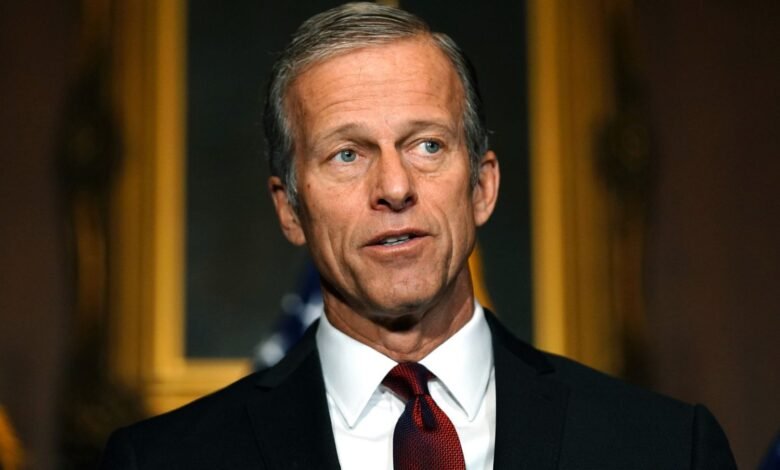
John Thune has established himself as one of the most influential figures in modern Senate leadership, carving a path marked by strategic acumen, legislative expertise, and unwavering commitment to conservative principles. As the current Senate Majority Leader, Thune’s journey from a South Dakota congressman to the upper echelons of congressional power represents a masterclass in political navigation and effective governance.
Born in Pierre, South Dakota, John Thune entered the political arena with a vision to represent his constituents while shaping national policy. His ascent through the ranks of Republican leadership showcases not only his political prowess but also his ability to build coalitions, negotiate complex legislative frameworks, and maintain party unity during turbulent times. Throughout his tenure, Thune has demonstrated an exceptional capacity to balance ideological conviction with pragmatic compromise—a rare quality in today’s polarized political environment.
The Senate Republican leader has consistently proven his value as both a strategist and legislator, earning respect from colleagues across the aisle while maintaining strong support within his party. His leadership style emphasizes collaboration, thorough preparation, and a deep understanding of Senate procedures and traditions. This approach has enabled him to secure significant victories that have shaped American policy and reinforced the Republican Party’s legislative agenda.
In this comprehensive analysis, we explore five powerful leadership wins that define John Thune’s legacy in the United States Senate. From his groundbreaking election victories to his masterful handling of complex legislative initiatives, these achievements illuminate why Thune stands as a pivotal figure in contemporary American politics. His contributions extend beyond mere partisan victories—they reflect a commitment to institutional integrity, fiscal responsibility, and the effective functioning of democratic governance.
1. Historic Victory Over Tom Daschle: A Political Earthquake
The Upset That Launched a Career
One of John Thune’s most significant political achievements occurred in 2004 when he defeated incumbent Senate Majority Leader Tom Daschle in what became one of the most closely watched races in American political history. This Senate election victory was unprecedented—Daschle was the first sitting Senate leader to lose reelection since 1952, making Thune’s triumph a seismic event in congressional politics.
The campaign showcased Thune’s leadership abilities and his connection with South Dakota voters who felt increasingly disconnected from Daschle’s Washington-centric approach. Despite facing a well-funded, nationally recognized opponent, Thune ran a disciplined, grassroots-focused campaign that emphasized local concerns, agricultural policy, and conservative values. His margin of victory, though narrow at roughly 4,500 votes, demonstrated his ability to mobilize supporters and articulate a compelling vision for South Dakota’s representation.
Strategic Campaign Excellence
The Republican senator’s campaign strategy incorporated sophisticated voter outreach, effective messaging on key issues, and relentless grassroots organizing. Thune understood that defeating a sitting majority leader required not just winning debates but fundamentally changing the electoral landscape in South Dakota. He invested heavily in rural outreach, attended countless town halls, and positioned himself as an authentic voice for South Dakota values in Washington.
This victory established John Thune as a rising star within the Republican Party and demonstrated his electoral prowess. The win sent shockwaves through the political establishment, proving that even the most entrenched political figures could be unseated by candidates who maintained strong constituent relationships and delivered effective messaging. This Senate leadership moment became a defining chapter in Thune’s career, setting the foundation for his future ascent to leadership positions.
2. Ascending to Senate Republican Whip: Building Coalition Power
Earning Trust Through Legislative Expertise
In 2019, John Thune achieved another significant leadership win when his colleagues elected him as Senate Republican Whip, the second-highest position in Senate Republican leadership. This role requires exceptional vote-counting skills, relationship management, and the ability to unite diverse factions within the party around common legislative objectives. Thune’s election to this position reflected widespread confidence in his judgment, negotiating skills, and commitment to advancing Republican priorities.
As Senate Whip, Thune assumed responsibility for understanding each senator’s position on legislation, identifying potential concerns, and working to secure the votes necessary to advance the party’s agenda. This position demands intimate knowledge of Senate procedures, personal relationships with all members, and the diplomatic skills to resolve disagreements before they derail important votes. Thune’s leadership in this capacity proved instrumental in advancing numerous Republican priorities while maintaining party cohesion during challenging legislative battles.
Mastering the Art of Vote Counting
The Republican leader’s effectiveness as whip stemmed from his methodical approach to building support for legislation. Rather than relying on pressure tactics, Thune emphasized listening to colleagues’ concerns, finding common ground, and crafting amendments that addressed legitimate objections without compromising core principles. This consultative approach earned him reputation as a fair-minded leader who valued input from all corners of the Republican conference.
During his tenure as whip, John Thune successfully navigated complex legislative challenges, including judicial confirmations, budget negotiations, and regulatory reform initiatives. His ability to maintain accurate vote counts and anticipate potential defections proved invaluable to Senate leadership, preventing embarrassing floor defeats and enabling more effective legislative planning. This Senate Republican achievement demonstrated Thune’s maturation as a strategic leader capable of managing the intricate dynamics of Senate politics.
3. Championing Tax Reform and Economic Growth Initiatives
Driving the Tax Cuts and Jobs Act
Among John Thune’s most impactful legislative achievements was his instrumental role in crafting and passing the Tax Cuts and Jobs Act of 2017. As a senior member of the Senate Finance Committee, Thune worked tirelessly to shape provisions affecting small businesses, pass-through entities, and middle-class families. His expertise in economic policy and his ability to communicate complex tax provisions in accessible terms proved crucial to building support for this landmark legislation.
The Republican senator recognized that comprehensive tax reform represented a generational opportunity to restructure America’s tax code, stimulate economic growth, and enhance competitiveness for American businesses. He championed provisions that simplified tax filing for millions of Americans while reducing corporate tax rates to internationally competitive levels. Thune’s contributions extended beyond mere advocacy—he actively participated in drafting specific provisions and negotiating compromises that ultimately secured passage.
Economic Impact and Long-Term Vision
Thune’s leadership on tax reform reflected his understanding of economic fundamentals and his commitment to policies that encourage investment, job creation, and wage growth. He articulated a compelling vision for how lower tax rates and simplified regulations could unleash entrepreneurial energy and expand economic opportunity. His work on this legislation demonstrated the kind of substantive policy expertise that distinguishes effective senators from mere politicians.
The Senate leader’s approach to tax reform emphasized both immediate economic benefits and long-term structural improvements to the tax code. He successfully advocated for provisions benefiting agricultural producers, small businesses, and middle-income families—constituencies particularly important to his South Dakota base. This legislative victory showcased Thune’s ability to balance national policy objectives with the specific needs of his constituents, reinforcing his effectiveness as both a state representative and national leader.
4. Becoming Senate Majority Leader: The Pinnacle of Institutional Power
A Historic Leadership Transition
In November 2024, John Thune achieved the pinnacle of Senate leadership when his Republican colleagues elected him as Senate Majority Leader, succeeding Mitch McConnell after his historic tenure. This election represented not just a personal triumph but a significant moment for the Republican Party as it transitioned to new leadership while maintaining its commitment to conservative principles and effective governance.
The leadership election demonstrated Thune’s broad support within the Republican conference. Despite competition from other capable senators, Thune’s reputation for fairness, his legislative expertise, and his proven ability to build consensus secured him the position. His colleagues recognized that navigating the complex challenges facing the Senate required a leader with both institutional knowledge and the diplomatic skills to manage diverse viewpoints within the caucus.
Setting a New Leadership Agenda
As Senate Majority Leader, John Thune assumed responsibility for setting the chamber’s legislative agenda, managing floor proceedings, and serving as the primary spokesperson for Senate Republicans. This role demands extraordinary skill in negotiation, comprehensive understanding of Senate rules and precedents, and the ability to balance competing priorities while maintaining party unity. Thune’s approach emphasizes regular communication with all members, transparent decision-making processes, and a commitment to advancing legislation through regular order rather than procedural shortcuts.
The Republican leader has articulated clear priorities for his tenure, including economic growth initiatives, national security enhancement, border security measures, and judicial confirmations. His leadership style reflects both his conservative principles and his pragmatic understanding that legislative success requires building coalitions and finding areas of bipartisan cooperation when possible. This historic achievement positions John Thune to shape American policy for years to come while stewarding the Senate as an institution.
5. Building Bipartisan Coalitions on Infrastructure and Rural Policy
Bridging the Partisan Divide
While known for his conservative principles, John Thune has demonstrated remarkable ability to work across party lines on issues affecting rural America, infrastructure development, and agricultural policy. His leadership approach recognizes that effective governance sometimes requires building bipartisan coalitions to address pressing national needs. This pragmatic orientation has enabled him to secure legislative victories that might otherwise have remained stalled in partisan gridlock.
The Senate Republican’s work on rural broadband expansion exemplifies this bipartisan approach. Recognizing that high-speed internet access represents critical infrastructure for 21st-century economic development, Thune championed legislation providing federal support for broadband deployment in underserved rural areas. He worked with Democratic colleagues to craft provisions that balanced competing priorities while ensuring that rural communities gained access to the digital economy.
Agricultural Advocacy and Rural Development
Thune’s leadership on agricultural issues reflects his deep understanding of farming communities and the challenges facing American agriculture. He has consistently advocated for farm bill provisions supporting crop insurance, conservation programs, and market access for agricultural products. His ability to articulate the needs of rural America to his Senate colleagues has resulted in important protections and support programs for agricultural producers.
The Republican leader has also championed infrastructure investments benefiting rural states, including highway funding, water system improvements, and transportation projects. His work demonstrates that effective Senate leadership involves not just partisan advancement but also addressing the practical needs of American communities. These bipartisan achievements have strengthened Thune’s reputation as a problem-solver who prioritizes results over political posturing, reinforcing his effectiveness as a legislative leader.
Conclusion
John Thune’s five powerful leadership wins illustrate a career defined by strategic thinking, legislative expertise, and unwavering commitment to effective governance. From his historic upset of Tom Daschle to his election as Senate Majority Leader, Thune has consistently demonstrated the qualities that distinguish exceptional political leaders: coalition-building skills, policy expertise, and the ability to navigate complex institutional dynamics while maintaining core principles.
As the Republican leader guides the Senate through an era of partisan polarization and complex policy challenges, his track record suggests he possesses the necessary skills to advance his party’s agenda while preserving the Senate’s institutional integrity. His emphasis on regular order, transparent processes, and respectful collaboration offers a model for leadership that prioritizes long-term institutional health over short-term tactical advantages.
The Senate Republican leader’s achievements reflect more than personal ambition—they represent a commitment to representative democracy, fiscal responsibility, and policies that promote economic growth and opportunity. Whether working within his party or building bipartisan coalitions, John Thune has proven himself an effective advocate for both his constituents and conservative principles. His leadership victories provide valuable lessons for understanding how legislative achievement occurs in America’s complex political system, demonstrating that success requires both principled conviction and pragmatic flexibility.
As John Thune continues to shape Senate proceedings and Republican strategy, his legacy will be measured not just by the legislation passed but by his stewardship of the Senate as an institution. His leadership wins serve as testament to the enduring importance of experience, relationship-building, and substantive policy expertise in achieving meaningful political change.
Read More: Zohran Mamdani 5 Powerful Wins That Prove He’s Unstoppable






